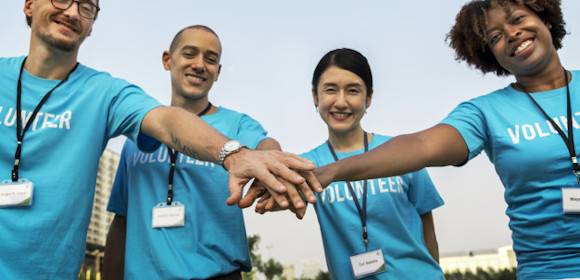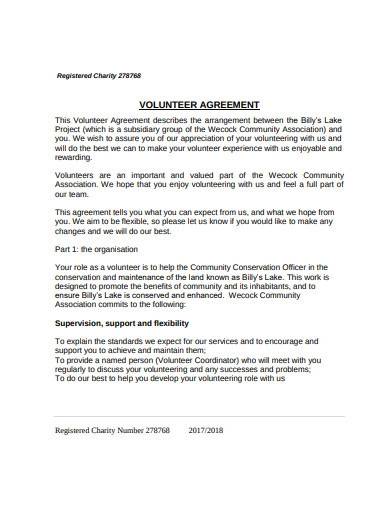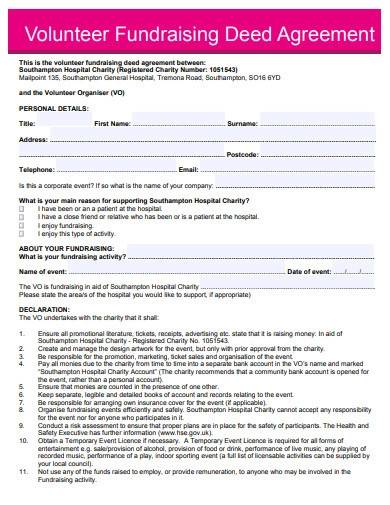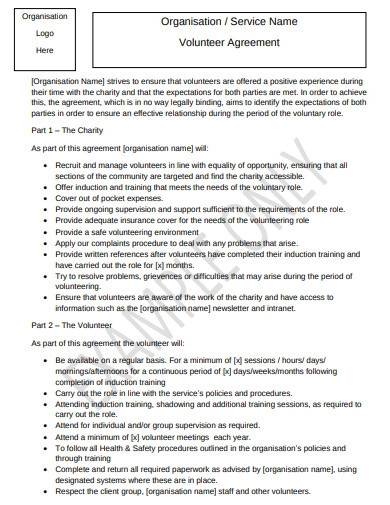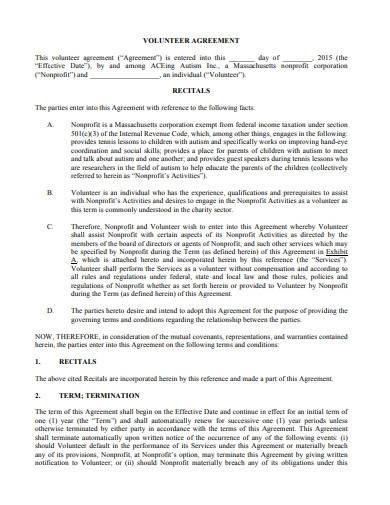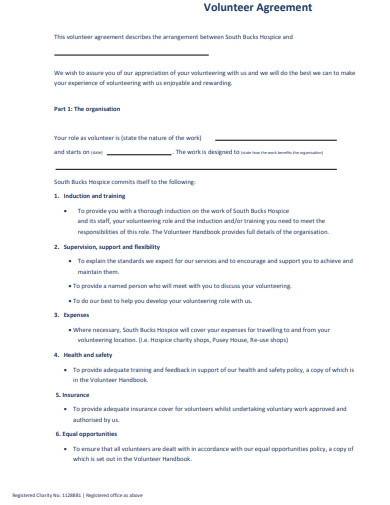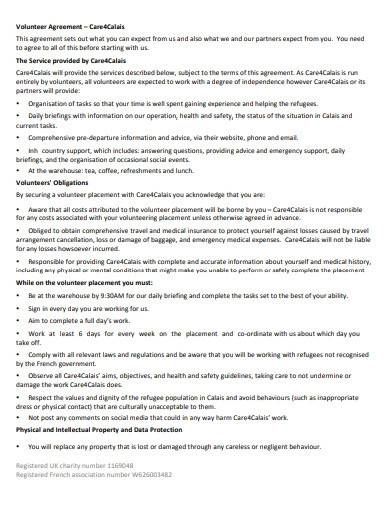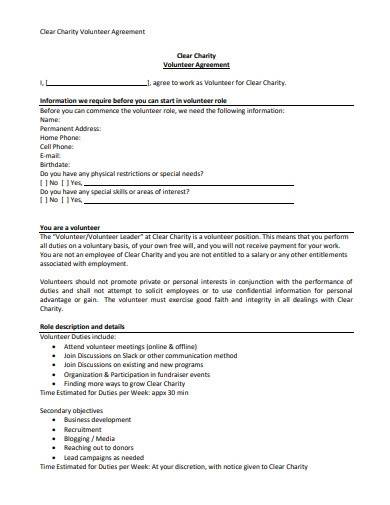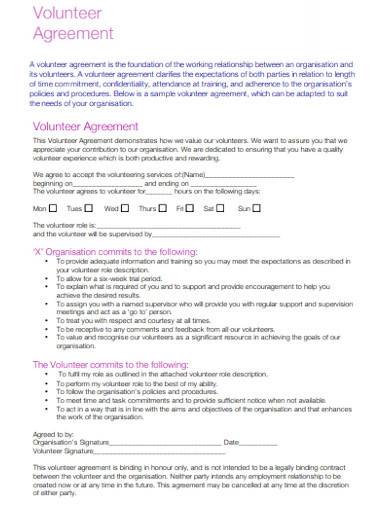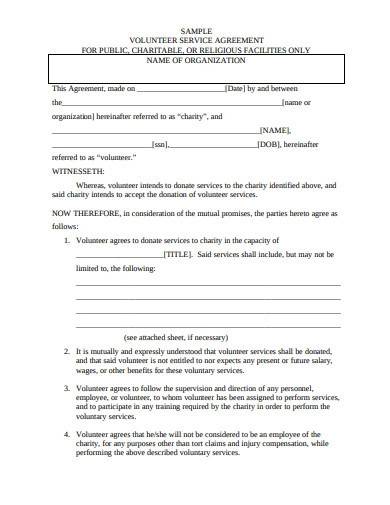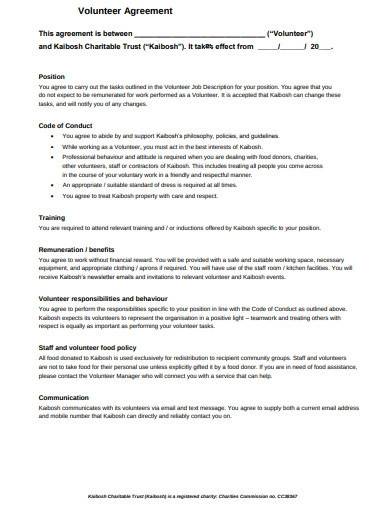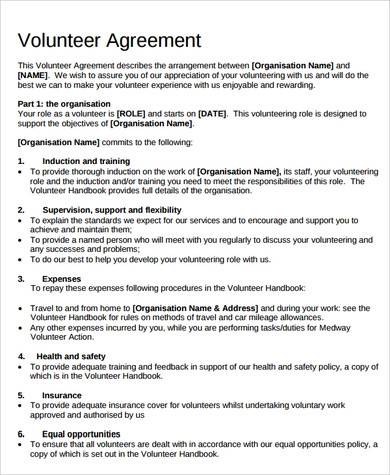An agreement starts with offer and acceptance. It’s amazing how this basic principle turns into a detailed and often complex agreement. If an offer is not accepted, then an agreement will never come to be. This is how the foundation of legal agreements and legal contracts are created. This agreement is put into writing for documentation purposes and then sealed with the signatures of the two parties who are involved in the transaction. The same situation takes when the signing of a charity volunteer agreement.
FREE 10+ Charity Volunteer Agreement Samples & Templates in PDF
1. Registered Charity Volunteer Agreement Template
2. Volunteer Fundraising Deed Agreement
3. Charity Organisation Volunteer Agreement
4. Sample Charity Volunteer Agreement
5. Charity Volunteering Agreement Form
6. Basic Charity Volunteer Agreement
7. Simple Charity Volunteer Agreement
8. Foundation Volunteer Agreement Template
9. Volunteer Service Agreement Template
10. Charity Volunteer Agreement Template
11. Volunteer Agreement Sample
What Is a Charity Volunteer Agreement?
There are mainly two parties in a charity volunteer agreement, and they are the charitable organization and the interested or potential volunteer. In this agreement, the charitable organization is the party making the offer, and the volunteer is the party accepting the offer. Charitable organizations are nonprofit organizations, so they don’t generate income or profit. This means that the volunteers are not paid for their services. So, why is there a need to provide an agreement if the volunteer doesn’t get paid at all? Isn’t the agreement about how much an individual is paid for their services? That is just part of the inclusions of an agreement, but it doesn’t really mean that the payment provision is always present in all agreement documents. A charity volunteer agreement is created to ensure that the volunteer understands and accepts the conditions and responsibilities of a charity volunteer.
There are a set of rules that a charity volunteer must follow, and these rules are provided in the agreement. The agreement also legally binds the volunteer to the agreement, as well as obligate them to abide by the terms and conditions stated in the document. Volunteers have specific duties and responsibilities that are also stated in the agreement. What the organization aims to gain in the agreement is the commitment of the volunteer. The agreement is also called a volunteer confidentiality agreement and a charity employment contract.
How to Make a Charity Volunteer Agreement
You should never sign an agreement if you don’t completely agree with all of its terms and conditions, regardless of the type of agreement. Be sure to scrutinize an agreement before finally giving your consent to be part of it. Here’s what you need to look out for.
1. Ambiguous Statements
How can you tell if the statement is ambiguous? If you’re familiar with the words used, you can point out statements that have a lot of meaning. Don’t skip this statement because it might just open a can of worms later on. Discuss this with the other party and arrange to change the word or words into something that is more defined.
2. Unfamiliar Clauses
The rule is simple, if you don’t understand what it means, then ask questions. There are a couple of clauses used in agreements and other legal documents, so it’s good to ask questions. What’s not good is agreeing to the agreement without understanding its contents.
3. New Statements
You must only see statements regarding the details that have been discussed. If you see a new statement, do not sign the document until it is explained to you, and until you are convinced that it’s okay. If it’s not okay, ask to change the document to include only the agreed details.
4. One-Sided Terms and Conditions
Do not accept one-sided conditions. The agreement should create a win-win situation for both parties. It should not be in favor of just one party.
5. Suspicious Provisions
If you think that a certain provision in the agreement is suspicious, as about it. Do not agree to it until you understand what it does, why it’s there, and if it’s really necessary.
FAQ’s
What are the benefits of volunteering for charity?
By offering your services to a charitable organization, you help them help other people. Which means you are also helping those who are in need through your labor of love. Through charitable events or gatherings, you will meet new people and make new friends. Some are even able to build a network of people that they can easily contact to help them with certain charitable causes. Also, helping those in need will make you happier and appreciated. So the saying goes, ” The takers eat better, but the givers sleep better.”
How many hours should a volunteer work?
There is a rule in volunteering called the 100-hour rule. The 100-hour rule is the ideal number of hours you should render for volunteer work per year. This tells us that you should only do a total of two hours of volunteer work per week. However, this does not mean that you are not allowed to volunteer more than two hours per week. You can offer more than two hours of your time per week provided that you have arranged it with the charitable institution you are affiliated with. Also, volunteer work hours should not make it complicated for you to do your regular paying job.
Do volunteers get allowances or incentives?
This depends on the provisions of the agreement. Some organizations may be able to provide allowances or incentives, while others don’t. But they can give certifications for the volunteer work that one has rendered.
Charitable organizations need to ensure that their volunteers are committed to doing volunteer work. This is so that they won’t run short of helping hands, as well as have too many volunteers at a time. It is also one way for them to keep track of the people who are willing to help with their cause.
Related Posts
FREE 10+ Charity Mission Statement Samples and Templates in MS Word | PDF
FREE 10+ Charity Pay Policy Samples & Templates in MS Word | PDF
FREE 5+ Charity Investment Policy Samples & Templates in MS Word | PDF
FREE 10+ Charity Privacy Policy Samples & Templates in MS Word | PDF
FREE 10+ Charity Standing Order Form Samples & Templates in MS Word | PDF | MS Excel
FREE 10+ Charity Risk Management Policy Samples & Templates in PDF
FREE 3+ Charity Investment Strategy Samples & Templates in PDF | MS Word
FREE 5+ Charity Marketing Policy Samples & Templates in PDF
FREE 5+ Charity Recruitment Policy Samples & Templates in MS Word | PDF
FREE 3+ Charity Management Accounts Samples & Templates in PDF
FREE 10+ Charity Gift Aid Form Samples & Templates in MS Word | PDF
FREE 10+ Charity Strategy Samples & Templates in MS Word | PDF
FREE 6+ Charity Marketing Strategy Samples & Templates in MS Word | PDF
FREE 10+ Charity Financial Policy Samples & Templates in MS Word | PDF
FREE 10+ Charity Financial Policies and Procedures Samples & Templates in MS Word | PDF
